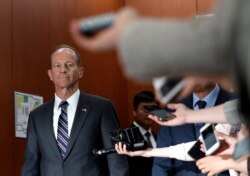The United States is adjusting its Taiwan policy and declassifying cables on Taiwan arms sales as China ramps up pressures on Taipei.
The U.S. is further clarifying that Washington’s one-China policy is different from Chinese Communist Party’s sovereignty claim over Taiwan.
A senior State Department official said Monday the latest U.S. moves were not a policy departure, but part of significant adjustments within the boundaries of Washington's longstanding "one-China" policy.
“The U.S. has long had a one-China policy. This is distinct from Beijing’s “One China Principle” under which the Chinese Communist Party asserts sovereignty over Taiwan. The U.S. takes no position on sovereignty over Taiwan,” said U.S. Assistant Secretary of State for East Asian and Pacific Affairs David Stilwell in his virtual remarks Monday to the Heritage Foundation.
Taiwan said it would continue to strengthen its defense capabilities, thanking the U.S. for its firm commitment to Taiwan’s security. In Beijing, Chinese officials urged the U.S. to stop elevating relations with Taiwan.
The U.S. and Taiwan are starting a new bilateral economic dialogue after Taiwan announced last week its plans to remove restrictions on American pork and beef imports. Some experts see the dialogue as a move toward a free trade agreement (FTA) between the U.S. and Taiwan.
“The new economic and commercial dialogue is great. But it should be thought of as a way to an FTA-plus. We still need an FTA. The dialogue is a way to get at issues, like workforce quality and energy supply, supply chain security, that fall outside the traditional parameters of an FTA negotiation,” Walter Lohman, director of The Heritage Foundation’s Asian Studies Center, told VOA Tuesday.
The U.S. also declassified two sets of diplomatic communications called cables from 1982 on Taiwan arms sales, and on Washington’s “Six Assurances” to Taiwan, which was seen as a loosely-kept secret. China strongly objects the U.S. arms sale to Taiwan.
“It is important to review history like this because Beijing has a habit of distorting it,” said Stilwell.
The directive of one of the cables indicates that the chief concern of the United States was maintaining peace across the Taiwan Strait. Therefore, the cable said the quantity and quality of arms provided to Taiwan would be conditioned entirely on the threat posed by China. The memo ends by offering “this final assurance: U.S. arms sales to Taiwan will continue,” said American Institute in Taiwan.
Under the “Six Assurances” offered by former U.S. President Ronald Reagan’s administration, the U.S. did not agree to prior consultation with Beijing on arms sales to Taiwan, nor did it agree to take any position regarding sovereignty over Taiwan. The U.S. also promised it will never pressure Taiwan to negotiate with Beijing.
Experts said that even though the United States is not setting new precedents in its relationship with Taiwan, the reassurances communicated by declassifying the 1982 cables seem new.
“They rarely mentioned the Six Assurances publicly,” said Bonnie Glaser, director of the China Power Project at the Center for Strategic and International Studies in Washington. “So this is an effort to elevate their importance.”
Glaser told VOA Tuesday that “declassifying the Six Assurances provides an opportunity for the U.S. to highlight its commitment to Taiwan and show it is a reliable partner. “
Ryan Haas, a foreign policy fellow at the Washington-based Brookings Institution, said Stilwell made elements of longstanding policy “more clear publicly” than they had been before, but indicated Stilwell did not depart from any of the key elements of America’s approach to cross-Strait relations.





